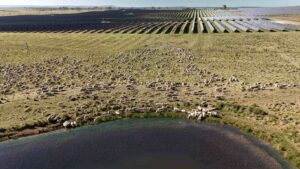The continued growth of Australia’s renewable sector and a sharp fall in the consumption of transport fuel because of Covid-19 have contributed to a fall in Australia’s greenhouse gas emissions, but most of the cuts may only be temporary.
The latest quarterly update of Australia’s greenhouse gas emissions published by the Department of Industry, Science, Energy and Resources show that Australia’s transport emissions have been the hardest hit by Covid-19 movement restrictions, as restrictions on air travel and a shift to working-from-home arrangements leading to dramatic reductions in petrol and jet-fuel use.
The update provides official figures for the period ending in March 2020 and shows Australia’s greenhouse gas emissions fell 1.4 per cent, compared to the year prior. Emissions falls were seen across most economic sectors, with falls in electricity emissions contributing to the largest reduction, along with ongoing falls in agricultural emissions caused by drought.
Electricity emissions fell 4.2 per cent in the year to March 2020, which was driven by increased uptake of wind and solar generation. Renewable energy generation increased 4.4 per cent in the first three months of 2020, resulting in a 0.9 per cent fall in coal generation and a 10.4 per cent fall in fossil gas generation.
However, fossil gas has been responsible for increasing emissions in other parts of the Australian economy, with emissions from gas production and LNG processing continuing to rise. Fugitive emissions continued their rapid rise, driven by Australia’s surging gas exports.
Australia’s greenhouse gas emissions have also been suppressed by reduced agricultural production, as the combined impacts of drought and flooding across various parts of Australia has seen a reduction in cattle numbers. However, with drought conditions easing, cattle numbers are set to rebound, along with emissions in the sector, over the next year.
The Department of Industry has produced a preliminary estimate of Australia’s greenhouse gas emissions for the second quarter of 2020, covering the period between April and June, which suggests that emissions have fallen by around 8 per cent, due to the impacts of Covid-19 and the rising use of renewable energy.
This could result in a temporary 10 million tonne reduction in Australia’s emissions for the 2020 year, falling to a total of 518 million tonnes.
The estimate suggests that electricity generation from fossil fuels has been one of the hardest hit sectors, with emissions from the use of coal and gas for electricity generation falling by an estimated 5.4 per cent.
However, Covid-19 is only responsible for a small part of this reduction from the electricity sector, with overall electricity demand falling by just 1.4 per cent in the quarter to June 2020, with the increasing use of wind and solar power responsible for most of the falls in greenhouse gas emissions.
Emissions from other sectors have also seen reductions due to factors more directly related to Covid-19, with transport emissions down considerably. Jet fuel emissions fell by around 79 per cent and petrol consumption has fallen by 26.7 per cent, as many Australians shifted to working-from-home arrangements.
Diesel consumption was down slightly, but with the fuel primarily used in by the resources sector and heavy transport, demand for diesel remained resilient despite the wider impacts of Covid-19 on fuel use.
 “These results show that the impacts COVID restrictions were felt most notably in the transport sector, with industrial sectors impacted only to a small degree,” the department said.
“These results show that the impacts COVID restrictions were felt most notably in the transport sector, with industrial sectors impacted only to a small degree,” the department said.
Finalised figures for Australia’s emissions during the early Covid-19 period are expected to be published by late November and could show that Australia’s emissions have fallen to their lowest levels since 1998.
However, federal energy and emissions reduction minister Angus Taylor acknowledged that the falls in emissions were due to ‘unsustainable’ factors and that “restrictions on Australians’ livelihoods and freedom to travel have substantially reduced emissions,” rather than structural changes to the Australian economy.
“With the impacts of COVID-19 restrictions being felt across the economy, emissions have reduced as expected,” Taylor said.
The Climate Council’s head of research Dr Martin Rice said that it was important to note that reductions in Australia’s greenhouse gas emissions were not the result of long-term changes to the Australian economy, but were instead ‘built on the suffering of Australians’.
“Today we’ve seen preliminary government data for the year to June 2020 that indicates emissions have dropped because of the coronavirus,” Dr Rice said. “Lowering our emissions is critical to keeping Australians safe, but it must be done in a way that is sustainable.”
“Unfortunately this drop is temporary and built upon the suffering of Australians and the economy. To reduce our emissions in the long-term, we need credible climate policy and clean jobs.”
An eventual return to global travel, which may be dependent on the development of a successful vaccine for Covid-19, would likely see Australia’s transport emissions to return to normal levels at some point in the future.
While strong ongoing investment in new wind and solar generation projects have helped drive long-term reductions in emissions from Australia’s electricity sector, the Morrison government has worked to shore-up demand for Australia’s fossil fuels in its response to Covid-19.
Federal energy minister Angus Taylor has repeatedly called for a ‘gas-led’ economic recovery, despite an assessment by the ACCC suggesting that gas producers are effectively price gouging Australian consumers. Taylor has also moved to relax fuel standards to allow unused jet fuels to be converted for use in vehicle transport.
Last week, Taylor introduced tabled proposed amendments to legislation establishing the Clean Energy Finance Corporation that could see the highly successful green fund used to fund unprofitable gas projects.






